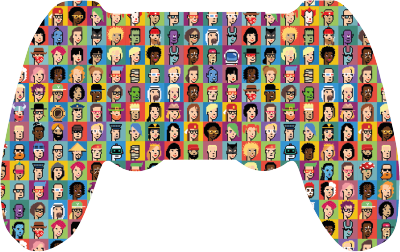Elena Esposito
Mark Andrejevic
Keynotes

Sonia Fizek
Video Games in Times of Climate Crisis. From Aesthetics to Ethics
It was high summer 2022. In many regions of Europe and worldwide, temperatures reached record heights. France suffered under unprecedented wildfires, with over 62,000 hectares of flora burned by the end of August 2022. Meanwhile, players of the Riders Republic (Ubisoft 2021), a major multiplayer sports video game, engaged in digital reforestation. They planted virtual trees, bringing to life an entirely new forested area that stayed in the game for others to experience long after the event had come to an end. The Riders Republic Rebirth event culminated in the first ever in-game climate march. The project was conceptualized in 2021 during a Green Game Jam, organized by the Playing for the Planet Alliance, the Environmental Program of the United Nations. Boris Maniora, Riders Republic gameplay director, believes that green activations such as Rebirth show the empowering impact games can have on their players.
However, video games are not only drivers of climate positivity or simulations of stunning natural settings. They are as much objects of culture as they are of nature. As virtual, immaterial and clean as they are portrayed within the framework of postindustrial capitalism (Maxwell and Miller 2012, 5), they are literally made out of natural resources and material labour. Video games rely on technologies and production dynamics that make those media possible in the first place. They are “finite resources in the closed system of planet Earth” (Cubitt 2017, 7).
This talk is an invitation to rethink video games and gaming within the context of climate crisis and environmental sustainability. It will map out the diverse intersections between the environment and video games: from representations of nature in games to eco-critical design and the materiality of digital technology.
Sources
Maxwell, R., and T. Miller. 2012. Greening the Media. Oxford: Oxford University Press.
Cubitt, S. 2016. Finite Media. Environmental Implications of Digital Technologies. Durham, NC: Duke University Press.
Sonia Fizek is a games and media scholar. She holds a professorship in Media and Game Studies at the Cologne Game Lab at TH Köln – University of Applied Sciences. Fizek is also a visiting professor at the University of Lower Silesia in Wroclaw (Poland), a co-editor-in-chief of the international Journal of Gaming and Virtual Worlds, and a newly appointed DiGRA Sustainability Officer for the Digital Games Research Association. In her book Playing at a Distance (MIT Press 2022), she explores the borderlands of video game aesthetic with focus on automation, AI and posthuman forms of play. Fizek’s current research concentrates on the environmental sustainability of video games. She is a principal investigator of “Greening Games. Building Higher Education Resources for Sustainable Video Game Production, Design and Critical Game Studies” (2021-2024, https://greeningames.eu) and a scientific lead in the project “STRATEGIES. Sustainable Transition for Europe’s Game Industries” (2024-2027, https://www.strategieshorizon.eu).
Vít Šisler
From Pixels to Pedagogy: Unveiling the Educational Power of Historical Video Games
In an era where video games serve as pivotal intersections between media industries, technologies, cultures, and societal practices, understanding their transformative potential necessitates a perspective that transcends mere gameplay. In this keynote, Vit Sisler, an associate professor of New Media Studies and a pioneering game designer, will inquire into the educational and societal implications of video games, particularly within the humanities. Drawing from over 15 years of experience, including his seminal work on award-winning games such as Attentat 1942, Train to Sachsenhausen, and Playing Kafka, Sisler will offer a critical reflection on the design processes of educational video games that explore complex historical narratives.
The talk will dissect various design concepts and methodologies employed in these games, accentuating their integration into both formal and informal educational settings. Through a comparative analysis, Sisler will discuss the collaborative efforts with educational institutions and domain experts, as well as the multifaceted challenges encountered during development. Additionally, the talk will explore how these games, as part of broader digital media environments, influence and are influenced by our evolving communicative practices. By examining these intersections, this keynote aspires to provide insights into the deepening mediatization of our society, urging us to look beyond play to fully comprehend the role of digital gaming in contemporary cultural transformations
Vít Šisler is an associate professor of New Media Studies at Charles University’s Faculty of Arts’ Institute of Information Studies and Librarianship. He was a visiting Fulbright scholar at Northwestern University in Chicago. His research focuses on information and communication technologies in the Middle East, educational games and simulations, and social aspects of video games. He regularly publishes in high-impact journals (New Media & Society; Information, Communication & Society; Contemporary Educational Psychology) and was a guest speaker at several universities (Stanford; University of Pennsylvania; New York University). He is currently a senior researcher in the project Systemic Risk Institute (SYRI, LX22NPO5101). Vít Šisler is a co-founder of the award-winning Charles Games studio and was the lead game designer of the critically-acclaimed games: Attentat 1942 (Apple Design Award Nominee, 2021) and Svoboda 1945: Liberation (Grand Jury Award, IndieCade, 2022).


Torill Elvira Mortensen
I feel this is right: Epistemic insecurity and transgressive online culture
Epistemic insecurity is the scourge of our time, as we have ever more information available, but less background for knowing whether we can trust this barrage of data. To handle this overload of information, we rely on social and emotional connections, and our expressions become led by how we feel about a piece of information, rather than by rigorous fact checking from authoritative sources.
Games give us a method for understanding this problem with the contemporary media eco-system, through the emphasis on participation and player or user-led research. Games ethnography works from the ideal that to understand the use of games, you need to play games, which means a games researcher is deeply embedded in the culture and practice of play, as well as the theories and methods of research. This allows for a sensitivity to nuances and in-culture language which demonstrates what gives users within the culture credibility and analytical depth.
Transferring this to general media studies, we need to be aware that the structures of games culture are just one facet of contemporary communication culture. Subcultures and communities grow out of common interests and go beyond immediate markers known from studies of traditional societal connections. Markers like spoken dialect and dress lose value, while the correct use of language or mastery of meme imagery gains meaning and weight. In this situation where our known and tested strategies for generating, developing and supporting trust are in flux, we look for different ways to anchor our knowledge, and we lean back on the most human of faculties: that of feeling and affect.
This talk will discuss how we can start to analytically critique this fluid understanding of what is true in a communication eco system where nothing is certain.
Torill Elvira Mortensen has studied games since the mid nineties, with her first publication on the topic in 1996, followed by a Doctor art. from Bergen University on text-based multi-user games in 2003. She has worked at Volda University College in Norway, the IT University of Copenhagen in Denmark, and is currently professor at Nord University, Bodø, Norway. Her research has been on social media use, game play and use, and transgressive game aesthetics and culture. Her current work focuses on how online communication relies on a feeling of belonging and identification rather than on geographical or formal community markers. Mortensen’s main publications are Perceiving play: the art and study of computer games (2009), The dark side of gameplay: Controversial issues in playful environments (Mortensen, Linderoth and Brown, eds., 2015), and The paradox of transgression in games (Mortensen and Jørgensen 2020).
